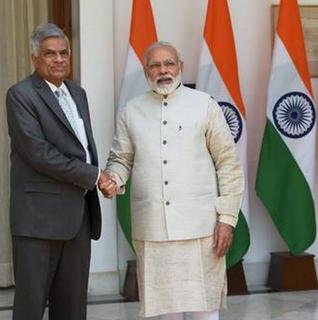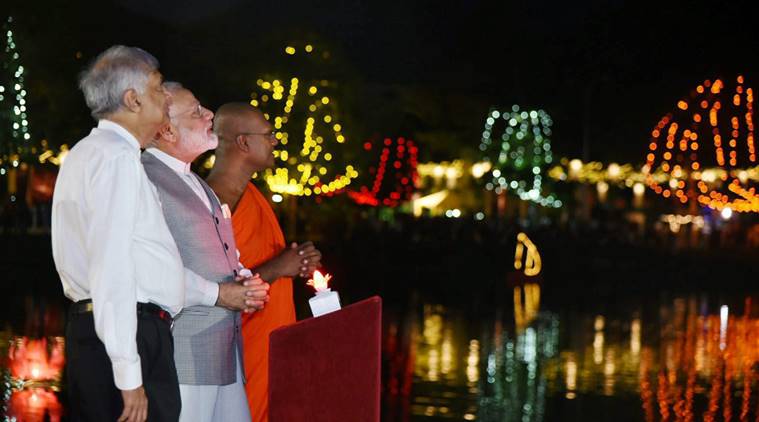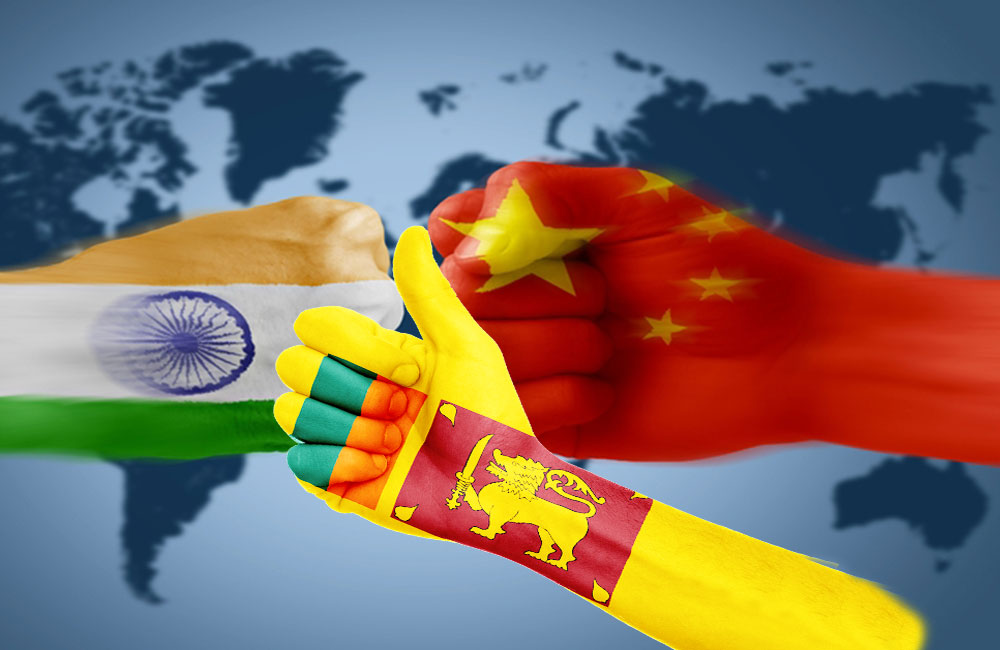Though issues over a proposed economic and technology pact, poaching by fishermen in each other's territorial waters and China's influence in the island nation remained, President Maithripala Sirisena and Prime Minister Ranil Wickremesinghe have kept the relationship warm by persisting with top-level engagements.
India and Sri Lanka managed to keep their relationship warm in 2017 with high-level exchanges and signing of pacts despite New Delhi's concerns over China's forays in the island nation, including its acquisition of the strategic port of Hambantota.
Though issues over a proposed economic and technology pact, poaching by fishermen in each other's territorial waters and China's influence in the island nation remained, President Maithripala Sirisena and Prime Minister Ranil Wickremesinghe have kept the relationship warm by persisting with top-level engagements.
Historically, India-Sri Lanka ties have witnessed ups and downs. In the 1980s, the Tamil question dominated relations and more recently differences have sometimes erupted over poaching by fishermen and Sri Lanka's increasing dependence on China for investment.
But the ties have showed signs of maturity, breaking away from the past towards an era of synergy and understanding.
"We have had another good year of excellent relations (with India)," a foreign ministry official here told PTI.
One of the key moments in bilateral ties this year came when Sri Lanka turned down China's request to dock one of its submarines at the Colombo port.
Under the previous dispensation of then president Mahinda Rajapaksa, Sri Lanka had allowed a Chinese submarine to dock at the Colombo port, drawing protests from India.
The year began with Sri Lanka vowing to immediately release 51 Indian fishermen from its custody following a high- level meeting between the two countries on the vexed issue.
Both sides also agreed to a set up Standard Operating Procedures (SOPs) to expedite the release and handing over of fishermen in each other's custody on completion of respective legal and procedural formalities.
Coast Guards of the two countries decided to set up a hotline for better coordination between the two maritime security forces.
In April, Indian Railways secured its largest export order from Sri Lanka Railways for the supply of 10 broad gauge diesel locomotives and six DMU (diesel multiple units) train sets worth Rs 680 crore.
India and Sri Lanka signed an MoU for "Cooperation in Economic Projects", to boost economic ties after wide-ranging talks between Prime Minister Narendra Modi and his Sri Lankan counterpart Ranil Wickremsinghe in New Delhi.

Prime Minister Narendra Modi with his Sri Lankan counterpart Ranil Wickremesinghe at Hyderabad House in New Delhi.
The Indian leadership expressed the hope that the island nation will complete its reconciliation process within the two-year deadline.
Both the sides also agreed to set up a Joint Working Group (JWG) to discuss the development of a port, petroleum and other industries in the Lankan city of Trincomalee.
Modi visited Sri Lanka in May on his second visit to the country in two years. His visit was mainly aimed at reinforcing the traditional connect between India and Sri Lanka at a time when China was seeking to make inroads in the island nation.
He participated in the Vesak Day celebrations, the biggest festival of Buddhists, and assured India's support to Sri Lanka for the island's nation-building endeavours.
 Prime Ministers Modi and Wickremesinghe observing Vesak celebrations in Colombo
Prime Ministers Modi and Wickremesinghe observing Vesak celebrations in Colombo
He said that the Sinhala and the Tamil communities in Sri Lanka should strengthen unity and harmony as he assured India's full support to the steps taken by Colombo to improve the living conditions of minority Tamils in the country.
The Indian Navy carried out a joint hydrographic survey of Sri Lanka's Weligama Bay and southern coast, in a reflection of the growing cooperation between navies of the two countries.
Sri Lanka, while sealing its debt-equity partnership with China on the strategic southern port of Hambantota, has not upset India which was curious to know if the Sino-Lanka relationship would hamper India's regional interests.
Cash-rich China has invested millions of dollars in Sri Lanka's infrastructure since the end of a brutal civil war in 2009.
Sri Lanka owed China USD 8 billion, then Finance Minister Ravi Karunanayake had said last year. The Sri Lankan government had signed a USD 1.1 billion deal in July to sell a 70 per cent stake in the Hambantota port to China.
Sri Lanka received USD 300 million as the initial payment under the 99-year lease agreement.
The opposition and trade unions in Sri Lanka have dubbed the port deal as a sell out of the country's national assets to China.
"India would be more likely to pressure Sri Lanka on issues that concern its own national security," said Dr Jehan Perera, a noted political commentator.
"Sri Lanka has consciously sought to follow a foreign policy that considers India to be an ally and assuages India's concern over its closeness to China, which could have geo- political consequences, which are adverse to India," he said.
Modi's engagements have been the cornerstone of the flourishing relationship. His trip to the island nation in May underscored his commitment to enhancing the relationship.
Modi was the chief guest at the event marking the Vesak Day, which commemorates Buddha's birth, enlightenment and the death.
"Buddhism and its various strands are deep seated in our governance, culture and philosophy," Modi had said, touching the heartstrings of the majority Buddhists.
Modi became the first Indian prime minister to reach out to 30,000 Indian Tamils in the central tea plantations.
Foreign Secretary S Jaishanker had said India "will henceforth" give "special consideration" to Indian Tamils in view of their special needs and their willingness to join the island's political mainstream.
The Indian government was quick to assist Sri Lanka when floods hit the country, killing more than 200 people in May.
The Indian Navy deployed three ships and over 300 personnel to assist Sri Lanka in its rescue and relief efforts for over 500,000 people.
Some observers even said that Modi was deliberately enhancing India's engagement with Sri Lanka at a time of China's growing influence in the island nation.
Despite Wickremesinghe's presence at the inauguration of China's ambitious Belt and Road Initiative (BRI), which India skipped, both India and Sri Lanka showed that the relationship could move on while understanding each other's concerns.
Showing India's long-standing interest on the issues of Tamils, Jaishankar met with the members of the Tamil National Alliance (TNA) and the Tamil Progressive Alliance (TPA).
Perera said: "Like the rest of the international community, they (India) would be oriented to give more time to the Sri Lankan government to resolve the outstanding Tamil issues.
Sri Lanka's option of moving closer to China has meant that India has stopped pressuring Sri Lanka with regard to its ethnic conflict despite Sri Lanka's failure to implement transitional justice measures".
Most observers believe that despite Sri Lanka's courtship with China, India's importance to Sri Lanka can never be discounted.
India, which is Sri Lanka's largest trading partner, has provided development assistance worth over USD 2.5 billion.
Over 70 per cent of the cargo handled at the Colombo port is transshipment cargo to and from India.
Sri Lanka is keen on the new trade pact, the Economic and Technology Cooperation Agreement (ETCA), which would enhance commercial ties with India's fast-growing southern states.
The Sri Lankan government may find some serious political opposition to ETCA as opposition parties have never missed opportunity to provoke anti-India sentiments to achieve domestic political gains.
(PTI)

Leave your comments
Login to post a comment
Post comment as a guest